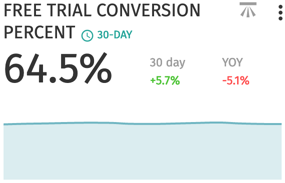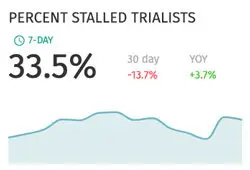Trials have always been an effective customer acquisition tool for video subscription services. However, from social media lookalike campaigns to exclusive content or popular movie promotions, the reason many customers sign up for a trial can vary widely. Increasing conversions requires properly measuring the free trial conversion rate and employing today’s free trial best practices.
FREE TRIAL CONVERSION RATE
Free Trial Conversion is one of the most important metrics to monitor in a successful SVoD business. It’s a simple calculation of the total number of trials that are successfully converted to paid, divided by the number eligible to convert on any given day.
———————————————-
Number of Trials Eligible to Convert
That said, in a subscription video business, there are other variables that can affect your conversion rate.
Since almost all video businesses batch their monthly billing rates into a daily billing run, failed billing attempts will impact your daily conversion numbers. Most companies employ different retry mechanisms and intervals for processing failed billing attempts (also called a dunning process). It is important to apply a consistent calculation when comparing conversion rates.
CONVERSION RATE METHODOLOGY
At Brightcove, we use the same methodology for calculating conversion rates across all of our customers, regardless of their dunning methodologies. This is important as it allows us to compare conversion rates of different customer cohorts within a single customer account and provide industry benchmarks to help you understand how your key metrics compare to similar services.

The way we calculate conversion rates is not too different from most calculations, with one small difference.
CONVERSION RATE VARIABLES
For example, if there are 100 trials that are eligible to convert on a given day and 70 of them pass billing, a standard calculation would be 70% conversion. However, at Brightcove, we also take failed billing transactions into account and standardize the conversion rate accordingly.
A number of those free trial customers may request a cancellation before their trial period ends and the rest would be eligible for conversion. Let’s say 20 (voluntary cancellation) of that original 100 request a cancellation and the other 80 go through billing. Of those 80, that same 70 successfully pass billing and convert to a paid user, and 10 fail billing and enter the dunning process.
When a trial conversion billing attempt fails, that subscription would then become eligible for a billing retry according to your dunning process billing rules. For example:
- 100 people sign up for a 7-day trial (day 1)
- 20 voluntarily cancel during the course of that trial (their trial will end on that bill date)
- 80 are processed for billing on day 8, and 10 of them fail
- The conversion rate for those day 1 customers is 77.8%
- 100 signed up, 20 canceled, and 10 held over for retry
———————————————-
90 Trials Eligible to Convert
The remaining 10 will then become eligible to convert at a later date.
Now let’s assume 100 more sign up for a trial on day 2, and during the trial process, 10 decide to cancel. Billing runs, and 10 more fail billing. If the standard retry logic is to retry credit cards one day later, the 10 failed billing transactions would be eligible for retry. Of those, 5 pass and convert, and 5 fail and stay in the dunning process.
So on day 9, there would be 95 eligible conversions: the 80 that signed up on day two and passed billing, the 10 that voluntarily churned, and the 5 that passed dunning. The conversion rate would be 89.5% (85/95).
CONVERSION RATE APPLICATIONS
You can also take the daily conversion rate and average that over 30 total days to calculate a monthly conversion rate. By breaking it down to this level, you can ensure that you are smoothing out any outliers and getting to a consistent number.
Furthermore, breaking your base into different campaigns and customer cohorts gives you an accurate read on how well you are acquiring customers. This allows you to consistently analyze which campaigns successfully bring you paying customers that stay in the service for the longer term.
FREE TRIAL BEST PRACTICES
With the proper trial conversion metrics in place, you’ll be able to test and implement several best practices that our customers have had success with.
-
Keep Trials Short. Seven-day trials convert the best. It provides enough time for potential subscribers to watch a few programs and get a sense of the library. We’ve heard the argument that longer trials provide more time to evaluate the video service and lead to lower month-one churn rates, but this hasn’t been our experience.
-
Dial-in your Onboarding Program. Establishing a consistent onboarding program for trials is a good first step to converting as well as retaining these customers throughout the first few months. For example, an email promoting shows with a high Attention Index ensures an entertaining first few days for each audience member. Hidden Gems also work well to showcase the depth of the content library.

-
Target Your Stalled Trialists. Some people sign up, watch one video, and never engage again. To increase your conversion rate with this cohort, we recommend a slightly more aggressive outreach program. Identify these stalled trialists and in addition to the regular onboarding program, make sure they receive at least one more email. Promoting titles with a high, shared audience may be a good hook to get these trialists beyond the first video and into your library.
-
Advertise More Viewing Options. A recent analysis by the Brightcove Customer Success team found that trialists watching on 2 or more devices convert at rates 10-15% higher than those watching on only 1 device. In addition to promoting select titles from your catalog, an advertisement for the other apps and devices you have invested in should be appended to your trialist messaging. Getting a trialist to log in on a second device may tip them into becoming a paying subscriber.
OPTIMIZING FREE TRIALS WITH BRIGHTCOVE
You only have a few days to nudge a trialist into becoming a subscriber. Having your data set up to quickly work with your marketing or email tool to target each cohort is essential. Your data defines an optimal target and can even influence the creative by identifying the titles that convert well.
Brightcove Audience Insights is designed to make this easy. Your data is harmonized and exportable, either as a csv or through a direct integration with Hubspot, Sailthru, or Segment. Audience Insights identifies Stalled Trialists and the videos that are the best Trial Drivers. And our Customer Success team meets with our clients every 1-2 weeks to share best practices and act as an additional business analyst, identifying opportunities to optimize your video service.
Learn more in our PLAY episode, “Hidden Treasure: Getting the Most from Your Content Library”.




